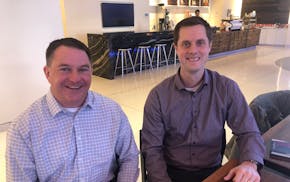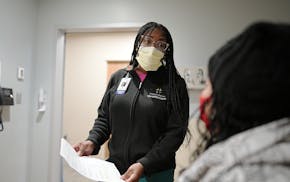If you're interested in Africa feeding itself through sustainable small farms and food processors, the latest developments at Partners in Food Solutions (PFS) are interesting.
David Dayhoff, veteran agribusiness and nutrition-nonprofit executive, has been hired as vice president of programs and operations.
PFS is several-year-old nonprofit consortium formed by General Mills, Cargill and European partners Royal DSM and Buhler to share technology and know-how through long-term relationships with small African food producers and processors. These firms and partners U.S. Agency for International Development (USAID) and nonprofit TechnoServe recognized that shipping grains to avoid starvation in East Africa was an expensive, short-term solution for a continent, often beset by war and political instability, that has the human and physical resources to feed itself.
Dayhoff, who spent the past couple of years developing business and nonprofit partnerships at Hunger-Free Minnesota, worked for 14 years at Cargill in technology, business development and international.
"This is a great fit for me," said Dayhoff, 43. "PFS has a unique mission and transformational model … Harnessing the know-how of global food companies and connecting that to small and growing food companies in Africa at scale is a breakthrough innovation."
And there's evidence of progress. PFS and USAID have invested about $25 million in cash, technology and expertise to get the operation up and running. And 650 corporate volunteers make it work.
To date, PFS has helped strengthen the capacity of 525 food companies in Ethiopia, Kenya, Malawi, Tanzania and Zambia, to the benefit of nearly 550,000 small farmers and their families. Instead of shipping in food from the U.S. and Europe, the PFS-supported companies have sold more than 15,000 metric tons of food products to food-aid buyers for vulnerable populations.
Jeff Dykstra, 42, the CEO of PFS, lived years ago in Zambia. He would buy a small jar of peanut butter that was made in South Africa, two countries away, for $6 in a store. Yet Dykstra lived very near small peanut farmers who lacked sufficient markets for their harvest.
"Now we work with a number of African companies, including one in Zambia, that makes peanut butter from peanuts grown by Zambian farmers," Dykstra said. "We are helping companies source food locally. As more investment goes into the farmer, we focus on the processor … and the know-how transfer with fortified foods such as corn-soy blend for school lunches. If the kids don't get the right micronutrients, before they are 5 years old … their learning potential can be capped. We're not sending experts over on airplanes. A lot of this is done on the Internet with volunteers. When a machine breaks down, they can send us a picture and then we help them learn how to fix it, or help them improve their manufacturing process."
The laudable goal is to help more small farmers and processors produce more safe, nutritious food at affordable prices to feed more people. More information: www.partnersinfoodsolutions.com.
Cambria underwrites juvenile arthritis kids camp
Some 60 kids with various levels of Juvenile Arthritis (JA) enjoyed a week of camp last week in Wright County as guests of Cambria, the LeSueur-based quartz countertop giant.
Cambria CEO Marty Davis estimated the company spent $150,000 to host the event, which was the first of its kind in Minnesota and committed to sponsoring the camp for the next five years. There are 13,000 children in the region diagnosed with JA. The grounds of Camp Courage near Maple Lake were temporarily renamed Camp Cambria and each camp attendee saw a personal sign with their name on it as they entered the camp.
"To be able to provide this kind of support is huge," said Liz Atchison, camp director for the Arthritis Foundation Upper Midwest Region. "A lot of these kids have never met another child with arthritis before. You don't have to talk about your disease here because everybody knows what it is."
Davis said he and his wife, Anne, became interested in the Juvenile Arthritis cause at the behest of former Minnesota Twin Justin Morneau, who has been raising money for the foundation with his wife, Krista, for the past five years.
Davis said it also makes good business sense to participate in philanthropic efforts. "This comes from employees, the company, our customers," Davis said.
Brother Mitch Davis agreed: "It solves a problem, it builds good employee relations and it helps society in general."
The camp was staffed with almost as many Cambria employee volunteers as campers, including senior members of the Cambria management team.
David Phelps
Peter Kelsey hasn't figured out retirement
Peter Kelsey, a college dropout and one-time busboy, sold his 300-employee New French Bakery last year after 20 years to a deep-pockets investment firm.
Now he's back in business.
"I like to fish, but not all the time," quipped Kelsey, 57. "I intend to open a 'bean-to-bar' chocolate bar company on E. Franklin Avenue … close to my house."
"We will import raw cocoa directly from farmers and cooperatives around the world. The chocolate will be made on the latest equipment [I've ordered] and will contain at least 70 percent cocoa to make it healthier. The offerings will include nuts, herbs and other fun stuff.
"It's about sustainable, organic when possible, fair trade, chocolate to consume as food, not candy," Kelsey said. "Chocolate is a 'super food' with lots of health benefits. … It will probably open in the January time frame if equipment shows up."
Kelsey, a cancer survivor and health nut, said he plans a facility that will make $1 million worth of chocolate in 2015 and employ several workers.

St. Anthony: 'Patient' investing paying off for St. Paul's Hill Capital

Jennifer Smith, leader of Burnsville's Innovative Office Solutions, has died

St. Anthony: Medical professions in Minnesota need more people of color in their ranks


